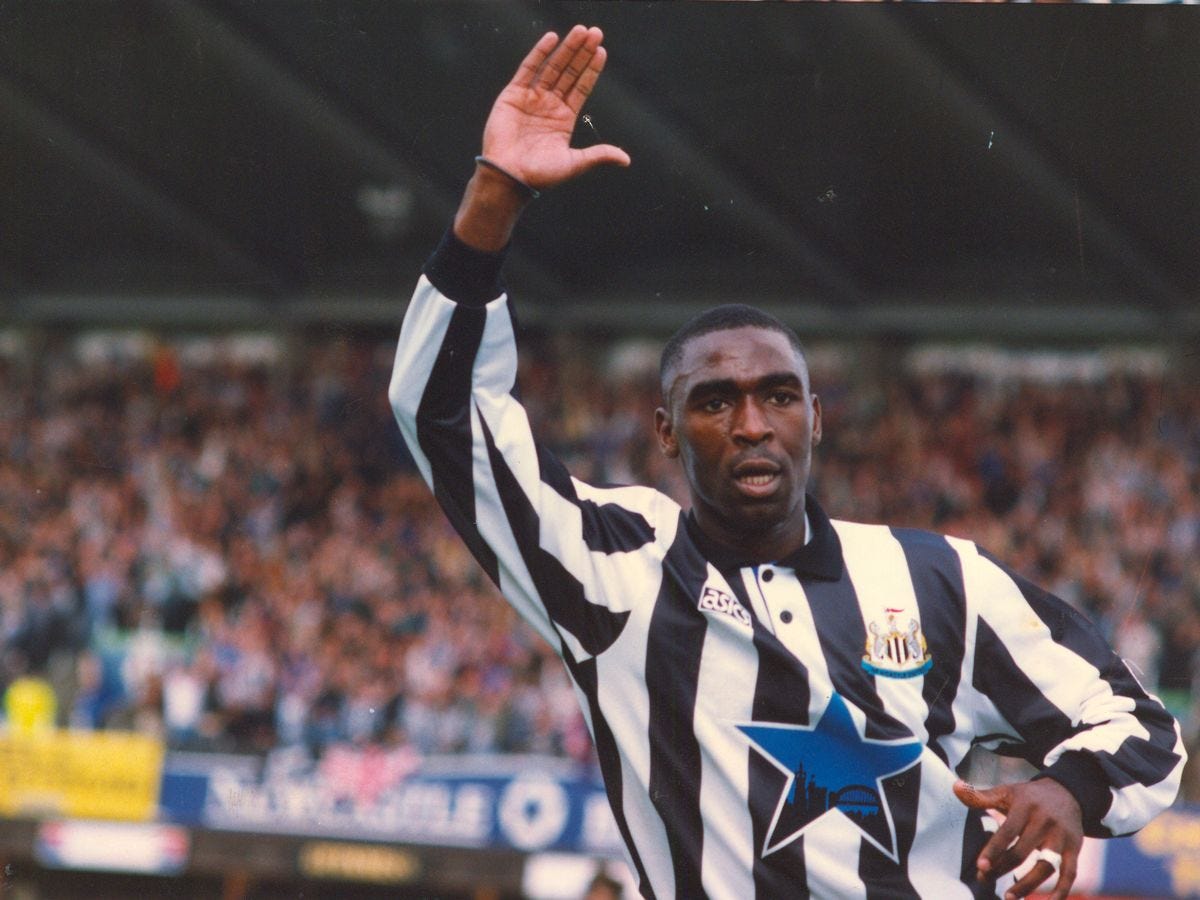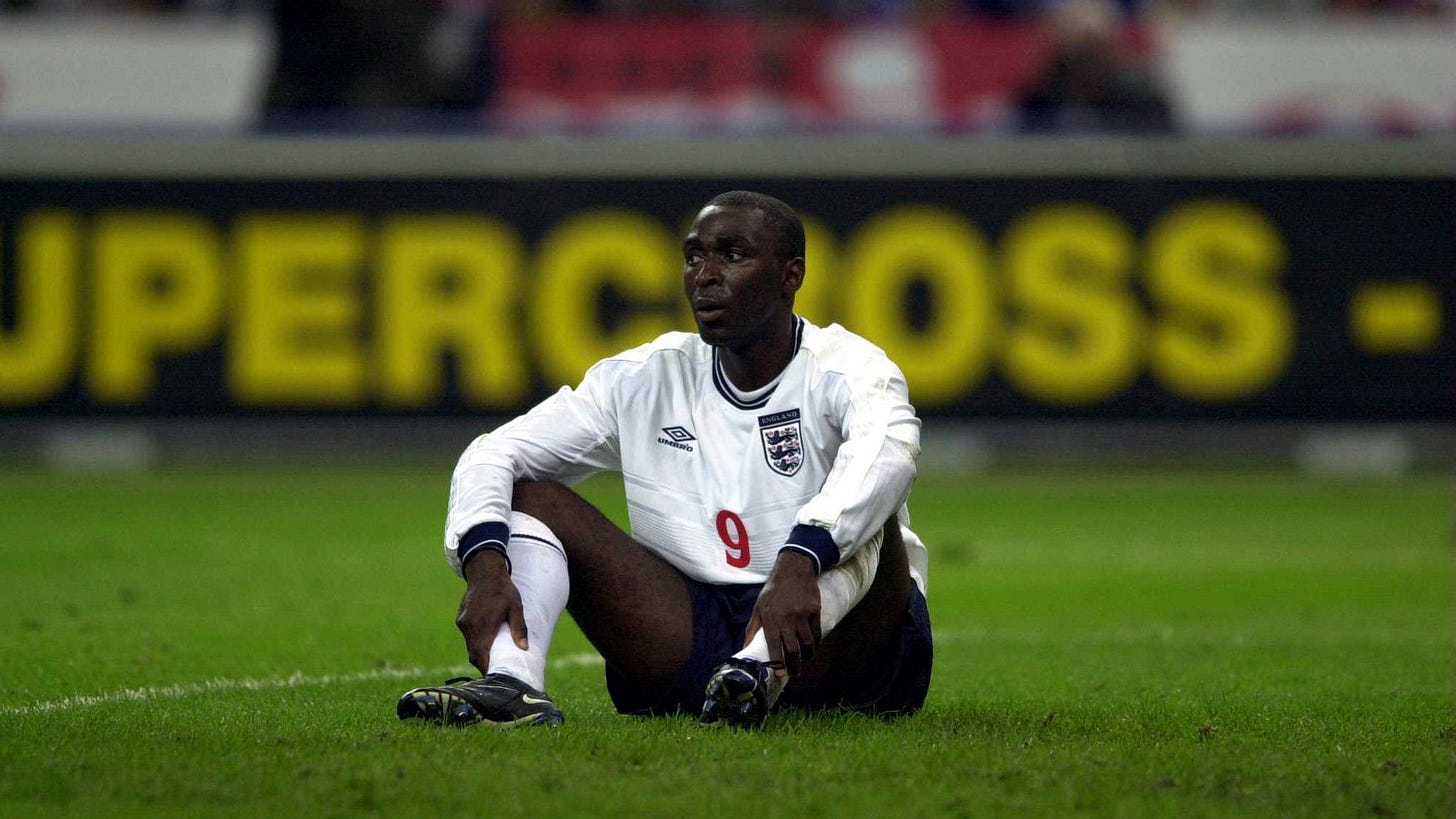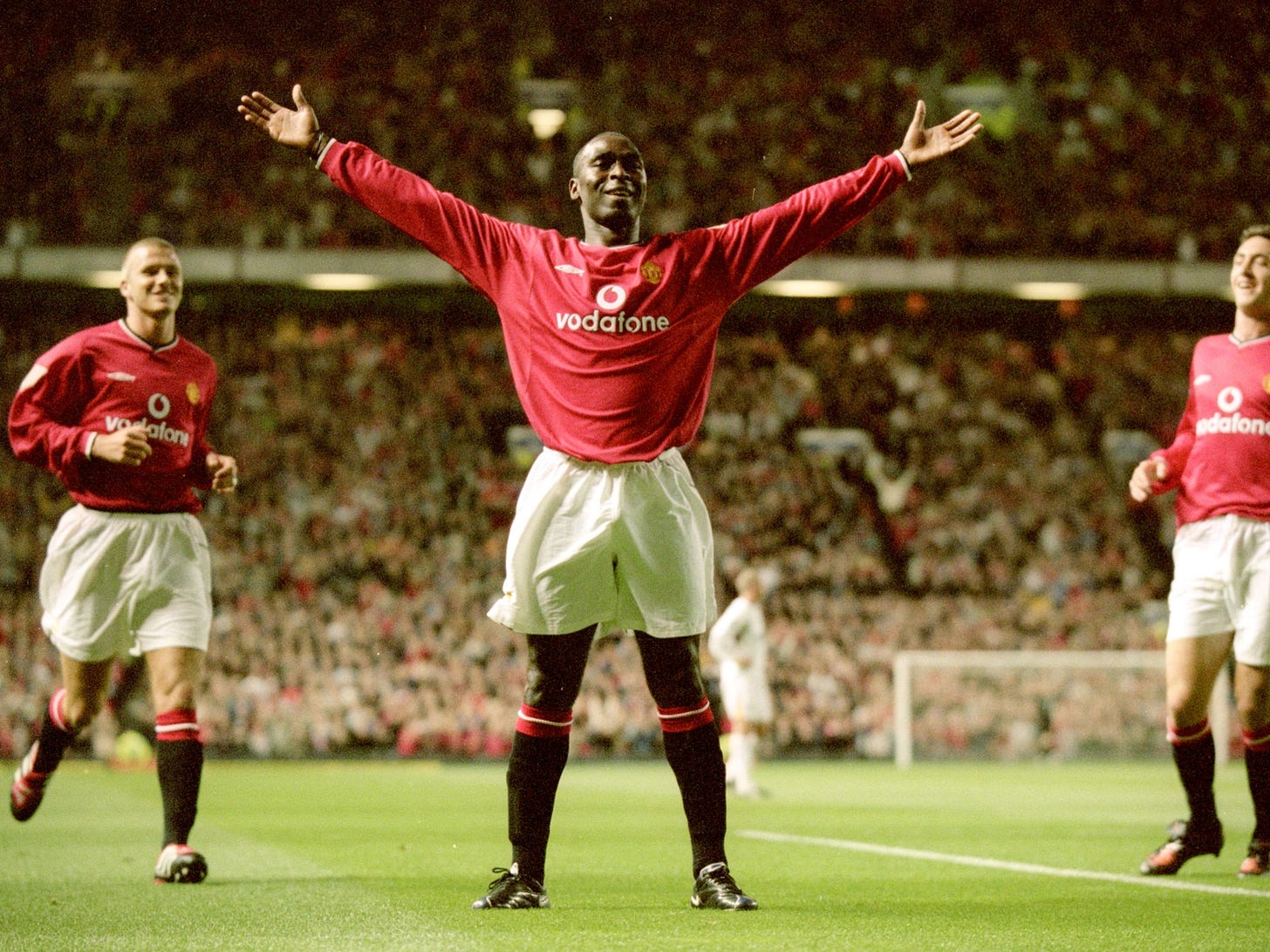Overlooked
He has the stats. So why is Andy Cole rarely mentioned amongst the greatest strikers this game has seen?
Ask any Premier League fan to name the division’s finest forwards and you will no doubt be greeted with similar answers.
Alan Shearer, scorer of a record 260 goals in the Premier League. Thierry Henry has often been cited as the league’s finest ever footballer following an incredible career, as has Wayne Rooney, Manchester United’s record goalscorer of all-time.
Eric Cantona’s impact in securing Manchester United’s dominance of the division’s first decade increases his claims. Modern forwards like Luis Suarez and Sergio Aguero have the fans of their respective clubs clamouring for their recognition amongst the top forwards of their generation, and Harry Kane easily deserves a mention as it looks almost guaranteed that he’ll break Alan Shearer’s record within the next few seasons. Erling Haaland will almost certainly be included amongst the greats when his time in this league ends.
But one name has too often been found missing from these lists as a lone piece.
Andy Cole.
The 1993/94 Golden Boot winner is currently the third highest Premier League goal scorer and has the 12th most Premier League assists. Even more impressive is that just 1 out of the 187 league goals he scored by his retirement in 2008 came from the penalty spot. To put that in comparison, Alan Shearer, Wayne Rooney and Sergio Aguero all took penalties for their clubs, swelling their goal totals up by 56, 23 and 26, respectively.
The numbers are all there to support his legend. So why could it be that the line leader in Manchester United’s famous ‘treble’ winning team keeps getting looked over?
Never really being *the* guy
Cole is remembered as an old-fashioned centre forward. Could this actually be counting against him? The silky French flair of Thierry Henry. The genius of Eric Cantona. The mesmeric touch and control of Dennis Bergkamp. All of these Premier League legends are remembered with fondness by fans and pundits alike. Wayne Rooney, Robbie Fowler and Michael Owen are etched into folklore for bursting onto the scene as youngsters with that pace and power that is so valued by the modern game. Now it seems that despite being the fastest player to reach 50 Premier League goals, nobody remembers Cole for any particular trait.
Rob Smyth once argued in The Guardian:
This is the price paid for becoming a player that teams can feel comfortable playing almost anywhere on the pitch in any situation. People don’t recognise how remarkable you truly were.
I noted in a previous piece about Wayne Rooney that this was why he has been demoted to “A great player” by so many rival fans, or young fans that may not have seen him at his peak, rather than being rightfully recognised as one of the greatest players the game has ever seen. He sacrificed most of the personal accolades he could’ve claimed in his career for the betterment of his teams.
The same is true of Andy Cole, but on a different level. While Rooney sacrificed his own potential as a forward so that the likes of Ronaldo and Tevez could reach their fullest potential, once they both moved on he became the focal point on which the whole United team spun. He had his time to be the man. Cole? He had one season. One Incredible season.
Cole still holds the Newcastle United record for most goals scored in a single season. He had led the line for them in the First Division and fired the Magpies back into the top-flight in 1992-93 and his totals of 34 goals and 13 assists in 1993-94 were outright leading figures in both categories, a feat that wouldn’t be repeated by a single player until Harry Kane did so in 2020-21.
The season after that he moved to Manchester United and joined a striking core initially consisting of Eric Cantona and Mark Hughes, and down the road containing the likes of Teddy Sheringham, Ole Gunnar Solskjaer, Karel Poborsky, and eventually Cole’s long-lost brother from another mother, Dwight Yorke.
There are not too many strike partnerships as beloved as Yorke and Cole. Becoming synonymous with each other and the dominant, treble winning United side they were a part of. The icon duo shared an instant rapport on and off the pitch and it showed. Clive Tyldesley famously remarking that “the combination between the Cole and Yorke was out of this world” after the formers strike against Barcelona in 1998. Unfortunately for Cole, he seems to be remembered more for this partnership than his own personal career. Many lists of greatest Premier League strikers feature these two as a package deal. Making it easy to forget the rest of his outstanding career and how great he was in his own right.
While the likes of Alan Shearer were undoubtedly the first-choice strikers at their clubs throughout their careers, Cole was always being rotated as competition at United at that time was so high. This served the club incredibly well but could have certainly impacted the legacy of the individual. Even as his career trickled off, and he played for teams lower down in the table he continued scoring. Including a world class strike against Liverpool for Blackburn.
International Disappointment
Ok, so we do need to talk about that England record. A single goal in 15 caps does not look great on paper. In fact, it would not look much better if it were chiselled in gold either. Compared to the likes of Alan Shearer or Teddy Sheringham?
There’s no doubting the impact his international heartache has had on his legacy. Incredible competition for places. High profile fallings out at international level and terrible injuries at terrible times, limited his international appearances to less than the likes of Darius Vassell and Matthew Upson.
Then of course, England manager, Glenn Hoddle’s famous accusation that he needed “six or seven chances to score one goal”. A line that seems to have cemented his international legacy as a disappointment.
Cole sees things through a different lens though, and for good reason too.
Speaking exclusively to the The Beautiful Game podcast in 2020, he spoke about how growing up, he noticed that if you played well for your club, you would get a call-up and the “opportunity to forge an England career,” but that his journey didn’t pan out like that.
Cole put his exclusion down to “politics” at the time. When asked if he was blackballed, by one the hosts, Cole replied: “Yeah, it was crazy.”
“In my case, football is not just football, football’s politics as well — politics play a big part. When I first was playing well at Newcastle, scoring goals — I should have been in England squad. [then Newcastle manager] Kevin Keegan brought me into his office and I had to listen to the phone call that he had with a guy called David Davis. He was giving Kevin every reason why I wasn’t in the England squad. I turned around and said to myself: ‘As a kid watching the England squad play, if you played well for your club you always got into the England squad. Naturally you get yourself into the team and you play, and you get the opportunity to try and forge some kind of England career. That wasn't happening for me. So, there's a big battle not to get me into the England team, or the England squad, and then when I finally got in the England squad, no-one would play me.”
Re-telling the only time he said he felt “comfortable” with England, Cole added:
“I remember Howard Wilkinson pulling me over after he took over the team for one game, and he goes: ‘Right, you’re going to play today. As long as I’ve got this job, you’re going to play.’
Cole was then pressed on his exclusion from the 1998 World Cup. Despite finishing that season with 25 goals in all competitions, the then-United striker was overlooked for the emerging Michael Owen, Paul Merson, Teddy Sheringham and Les Ferdinand.
Asked who he would replace himself with if he was the manager, Cole said that it wasn’t about swapping himself, “I knew I should have gone.”
“I'm not looking to swap myself anybody. That season I had done more for Manchester United, think I ended up getting 20-odd goals for Man United that season. If you look at everyone else’s goal return that year, I’m not sure how many got 25 goals. But that’s when the shenanigans started with Glenn Hoddle ... so when I got left out, I had to laugh to myself. I had to. I knew, if it wasn't for the politics involved in the football, I’d have gone to the World Cup.”
I can’t comment on the truth of these comments, but what I can say is that every single football player in the world only thrives in a situation if they’re filled with confidence. A constantly changing management team and no guarantee that you’ll be playing consistently wouldn’t fill any player with the confidence to play well, so you can see why Cole’s form dropped on the rare occasion that he went away with the National Team. You can also understand how on the one occasion he was given that confidence and trust by his national team manager, he felt loose and comfortable.
On the other side of things, you can understand why his international record stands against him. In this time period, most people wouldn’t have been watching opposition teams games and seeing Cole score a huge amount for Newcastle and Manchester United. But, those fans would have tuned in for International fixtures, and seeing Cole cut the surly and stand-offish figure that he was notorious for when his confidence was low would clearly colour a certain idea about a player into the minds of many.
Cole was a confidence player and, when it went, he could be absolutely awful: you could almost see him having a complete meltdown on the pitch. In his first full season at Old Trafford, 1995-96, he was nothing short of embarrassing. Crushed by insecurity, the teething problems of a dramatic change in his footballing identity - United bought a goalscorer and made him into a footballer - and, most of all, the obvious contempt shown him by Old Trafford main's man, Eric Cantona. Against Liverpool at Wembley, he came dangerously close to becoming the first player to have a nervous breakdown during an FA Cup final.
The Unseen
The truth of it all is, Andrew Alexander Cole was more than just a normal jack-of-all-trades Number 9.
Few strikers have reinvented themselves as efficiently and successfully. Few have had the mental strength to overcome such misfortune (in 1996 he suffered pneumonia - in the summer - and then, when he was recovering in the reserves, had both legs broken in one strike from Neil “Razor” Ruddock), or such relentless, savage abuse from the public and the media, and speculation about his future. In October 1997, for example, Cole responded to morning headlines that he was to be replaced dropped by Ferguson almost immediately and replaced by Marcelo Salas by lashing in a first-half hat-trick.
Few formed as many outstanding partnerships: whereas Shearer, in his later years, and Owen couldn't gel with anybody, Cole was part of, at a conservative estimate, three massively successful pairings with Peter Beardsley, Dwight Yorke and Darius Vassell.
Few had such range to their goalscoring: delicate chips, overhead kicks (three before Christmas in the 1999-00 season alone), solo efforts, headers, head down and lash it, head up and place it. Few worked as hard and unselfishly, and few maintained the respect of United fans after moving to Manchester City. Peter Schmeichel couldn't manage it; They still sing Andy, Andy Cole’s name around Old Trafford to this day.
Most of all, my god he could play.
No English striker has moved around off the ball as effectively since Lineker, and none as aggressively and relentlessly in history. Cole ran defenders into the ground, spun around them, picked them back up and then ran them into the ground once again. Marcel Desailly once called Cole one of the hardest opponents he had faced, chiefly because of his movement.
The subtlety of his link-up play was grossly underrated (A friend of mine hates that word. You know who you are, but I’m telling you it fits here). Two assists in particular stand out: a half-volleyed, outside-of-the-foot lob for Ryan Giggs against Aston Villa in 1997, and a wonderfully precise, dipping cross for Yorke to equalise in Juventus in 1999.
That game, when United came from 2-0 down in Turin to win 3-2 and reach the European Cup final, was Cole's zenith. He and Yorke made Juventus - the high priests of catenaccio - doubt their faith by giving them the biggest chasing (and chastening) of their lives. Their exquisite, knife-through-butter goal in Barcelona had even the opposing manager Louis van Gaal, modern football's biggest romantic, swooning.
The Champions League was and is of a higher standard than international football, yet Cole struggled badly with England. The notion that he was not good enough to play for England above anyone else is irreconcilable with those performances in Juventus and Barcelona in particular.
Cole's first four caps came under different managers, fostering a sense of alienation, as mentioned previously, that never went away. It certainly wasn’t helped by a succession of roadblocks called Shearer, Owen, Sheringham, Fowler, Ferdinand and Wright - all masters of one trade, but none a jack of all of them.
Cole, more than most, needed to belong, and when he eventually got a decent run with England in 2000-01, there was too much water under the bridge for him to succeed. Even then, it was little short of farcical that Sven-Goran Eriksson, who called Cole a "great international football player" after his first game in charge, was bullied by the public and the media into replacing Cole with Emile Heskey. As was often the case with United players in the late 1990s and 2000s, he was used as a scapegoat.
By that point he was a figure of ridicule, a process in which, admittedly, he did not always help himself. As noted before, when not filled with confidence, he could be surly and tough to speak with - United were the only club at which he has truly settled - and his decision to release a truly awful rap record in 1999, 'Outstanding', simply made him stand out to his detractors even more.
His time at Old Trafford coincided with the peak of ABU (Anyone But United) culture, a movement whose credibility should have been shattered by, among other things, the haranguing of David Beckham and Wayne Rooney and the ill-judged that "if the Neville’s can play for England, so can I" chant. Yet nobody questioned the verdict on Cole. And to this day, nobody seems to want to question it. A pity.
But Cole doesn’t need the support of millions of fans to prove how much of a footballing legend he was. "My record speaks for itself," he said, "and when I have finished it will all be down there in black and white for people to see."
A fitting epitaph for Andy Cole’s footballing career.






